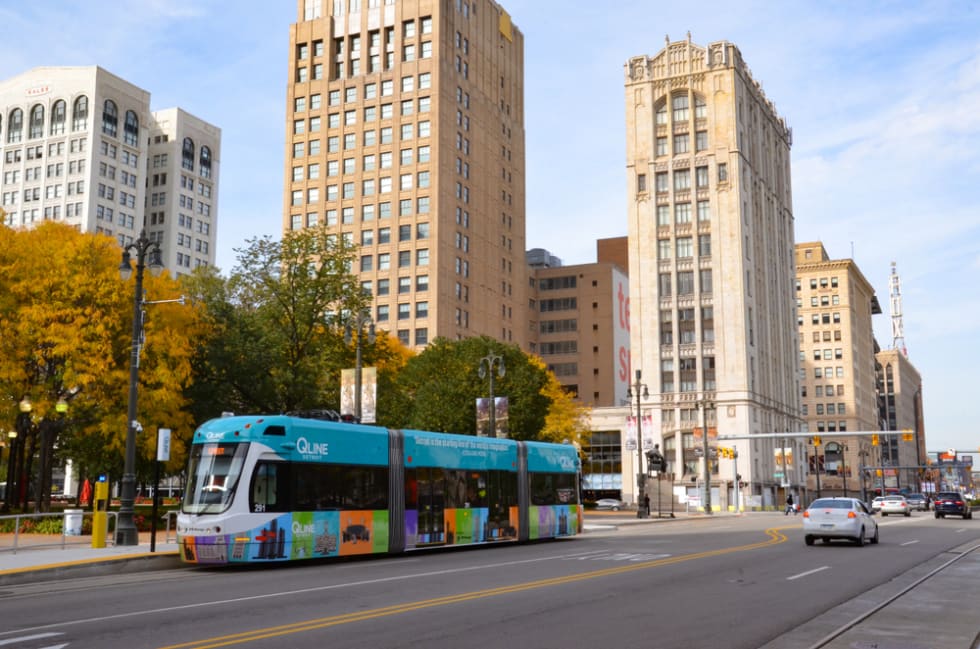Cost of Living in Detroit, MI [2025]

Are you considering moving to Detroit? Known as The Motor City, this vibrant and historic city has a rich cultural scene, a thriving music legacy, and a resurgence in innovation and entrepreneurship. From the iconic Motown Museum to the bustling downtown districts, Detroit offers a unique blend of history, arts, and modern revitalization.
Ready to explore the cost of living in Detroit? Before taking on a new city, it's important to take the time and research whether it's the best fit for your budget. You also need to consider housing prices and taxes, entertainment costs, transportation expenses, and healthcare fees to put together the cost of living puzzle for Detroit.
Cost of Living in Detroit, MI
What Is the Cost of Living in Detroit, MI?
Detroit comes with a very low cost of living compared to similar-sized cities in the Midwest and Northeast. We took a look at the cost of living data compiled by Best Places. Detroit is currently 8.2% lower than the U.S. average. Here's a look at how the categories break down and what to expect for your budget.
| Cost of Living | Detroit | Michigan | U.S. |
|---|---|---|---|
| Overall | 91.8 | 91.5 | 100 |
| Grocery | 93.4 | 89 | 100 |
| Health | 81.8 | 84.8 | 100 |
| Housing | 23.5 | 71.2 | 100 |
| Median Home Cost | $71,600 | $218,700 | $338,100 |
| Utilities | 89.7 | 100.1 | 100 |
| Transportation | 178.3 | 115.1 | 100 |
| Miscellaneous | 114.0 | 95.9 | 100 |
Although Detroit enjoys incredibly low housing, healthcare, and utilities costs, not every category is inexpensive. You'll pay more than the state and U.S. average for transportation.
Where is the Cost of Living Highest in Detroit, MI?
If you're wondering where the highest rents are in Detroit, you can look to Downtown Detroit. Renters have their choice of modest apartments or luxury high-rises with updated amenities. The average rent in Downtown Detroit goes for $1,750 a month.
Where is the Cost of Living Most Affordable in Detroit, MI?
Detroit is already inexpensive, but there are neighborhoods that are cheaper than others. We took a look at our listings and data and found Tireman is among the cheapest neighborhoods in Detroit. Rents are around $950 in Tireman. Keep in mind it's important to consider the crime rates of any inexpensive neighborhood, especially located in a metro area. You should survey the area and consider safety features before you sign your next lease.
How Much Is Rent in Detroit, MI?
We looked over the data from our February 2025 Detroit Rent Report and found the overall median rent in Detroit is $1,073 a month, after rising 1.9% last month. Prices and are now up 1.6% year-over-year. The median rent for a one-bedroom apartment is $776 and a two-bedroom apartment is $1,039 a month. This data shows Detroit’s rent growth over the past year has has fallen behind the state average (3.6%) but has outpaced the national average (-0.5%).
| Bedrooms | Median Rent Price |
|---|---|
| Overall | $1,073 |
| 1-Bedrooms | $776 |
| 2-Bedrooms | $1,039 |
How Much is a 1-Bedroom Apartment in Detroit, MI?
Our February 2025 data from our rent report shows the median rent for one-bedroom apartment in Detroit is $776 a month. We also took a look at some of the neighborhoods around Detroit to give you an idea of what to expect from rents.
| Area | Rent |
|---|---|
| Overall | $1,073 |
| Dearborn | $850 |
| Royal Oak | $1,411 |
| Woodhaven | $1496 |
How Much is a 2-Bedroom Apartment in Detroit, MI?
If you're looking for more space, you can look at our rent report to see the median cost of a two-bedroom apartment in Detroit is of January 2025 is $1,039 a month. If you want to expand your search, we also took a look at areas around Detroit to give you an idea of what to expect from two-bedroom apartment rents.
| Area | Rent |
|---|---|
| Overall | $1,073 |
| Dearborn | $875 |
| Royal Oak | $1,991 |
| Woodhaven | $2,005 |
What Salary Do I Need to Live in Detroit, MI?
We recommend using the 30% rule as a common guideline, which suggests budgeting no more than 30% of your pre-tax earnings toward rent. For a one-bedroom apartment that costs $776 per month, you should ideally be making at least $31,040 annually, $2,586.66 a month, or about $14.92 an hour.
It's also wise to consider MIT’s living wage data, which considers the living wage. Their data shows you need $20.42 to stay above the poverty line to comfortably afford housing, food, transportation, and other essentials. It does not cover travel, emergencies, and extras like student debt repayments.
You can also consider the U.S. Census Bureau figures. The median household income in Detroit stands at $39,575 per year, or $3,297.92 monthly, or about $20.03 per hour. The national median household income is significantly higher at $78,538 per year. With Detroit's low cost of living, landing a decent job in the automobile industry, healthcare, defense, logistics, or a remote job. The right career could mean a comfortable lifestyle with enough in your budget to pursue travel, hobbies, and savings.

How Much is Housing in Detroit, MI?
Detroit housing prices are also significantly lower than the state and U.S. averages. If you're interested in purchasing a home, you can look to the median home prices reported by Best Places. The current median home price in Detroit is $71,600. You can compare that to the median home price in Michigan of $218,700 and the median home price in the U.S. of $338,100.
How Much Is Transportation in Detroit, MI?
Detroit’s official public transportation operator is the Detroit Department of Transportation (DDOT), serving the city, surrounding suburbs, and neighboring towns. There are 68 bus routes to choose from, with access readily available through the online bus schedules.
Public transportation can sometimes be unreliable depending on a number of factors, so you will most likely need to consider having a vehicle of your own.
If you're a single adult with no children, you'll spend about $9,840 for transportation in Detroit annually. A family of four, including two working adults and two children, will pay $16,505 for transportation annually. Gasoline prices are around $3.41 per gallon, a bit lower than the national average of $3.52.
How Much Are Groceries in Detroit, MI?
Detroit offers countless dining options, with a handful of authentic foods from the city you have to add to your must-eat list, including double-baked rye bread, zip sauce, Boston coolers, Detroit-style pizza, and Coney dogs.
Eating out in Detroit costs an average of $19 for a meal at an inexpensive restaurant. A three-course dinner for two people at a mid-range restaurant will run $75 without alcohol or dessert.
If you're a single adult without children, you can expect to pay at least $4,138 on food per year. However, if you're a family of four with two working adults and two children, you can expect to pay $12,162 per year for food.
You can anticipate paying below the national average for food items from local grocery stores like Whole Foods Market, Greenfield Market, or Prince Valley Market. For example, one gallon of regular milk will run you $3.25 in the grocery store, with the national average being $3.99.

How Much Is Childcare in Detroit, MI?
If you have kids, childcare will take up a significant portion of your budget. Fortunately, Detroit does have lower child care costs than many other areas of the country. If you have one child, you'll spend an average of $13,078 a. year. For two children, the costs go up to $24,520 a year.
You can get creative with your childcare costs by looking in neighborhoods that don't have daycare shortages and long wait lists. Choosing a flexible schedule to work around your partner can also help reduce the need for childcare costs.
How Much Is Healthcare in Detroit, MI?
When planning your budget in Detroit, you will also want to account for proper medical care. A single adult without children will pay around $2,965 for medical care over the year. Two working adults with two children will pay $7,569. You can save on costs by shopping around on deductibles and exploring employee-sponsored healthcare plans. It's also wise to save up for an emergency fund for your medical costs.
How Much Are Utilities in Detroit, MI?
Winters in Detroit are windy, snowy, and freezing. The coldest days of the year fall in January with an average overnight temperature of 21°. Summers are known for warmth. July is the hottest month with an average daytime high of 83°.
To combat more than three months of freezing winter, you'll need to account for higher utilities in the winter to keep warm. Detroit’s basic utilities include electricity, heating, cooling, water, and garbage, running $251.12 for a 915-sq. ft. apartment. That's higher than the U.S. average utility bill of $206.50 a month.
Adding on a basic phone plan with the Internet with 60 Mbps or more with unlimited data, cable/ADSL will cost you an extra $108.61 for a total of $359.73 each month.
Before you move, find out how much utilities will cost in an apartment so you can get a better idea of what to expect.

Detroit, MI Fitness and Entertainment
Knowing how brutal winters are in Detroit, you’ll want to consider fitness club membership costs to keep fit throughout the year. The monthly fee for a fitness club membership for one adult is $43.
Otherwise, when the weather permits, you can enjoy the beautiful landscape of Detroit outdoors. Enjoy hiking trails across the city like the Dequindre Cut Greenway or the Detroit Riverfront, both located downtown. Otherwise, take to other walking and hiking paths with a more scenic view, like Lake St. Clair Metropark Loop, the Belle Isle Lighthouse Trail, or the Macomb Orchard Trail.
There is plenty of entertainment throughout the city, though if you enjoy the local cinema, it will cost you $12 without snacks or drinks. You can also save a few bucks by checking out some of Detroit’s best parks and nature attractions, including Belle Isle Park, Anna Scripps Whitcomb Conservatory, or William G. Milliken State Park and Harbor.
How Much Are Taxes in Detroit, MI?
There's good news for renters in Detroit. Michigan has a flat income tax rate, though some cities charge an additional rate. In Detroit, the income tax rate is 2.45%, and the sales tax rate is 6.00%. Unfortunately for homebuyers, the state has some of the highest property taxes in the country. If you plan to stay a renter, you can enjoy relatively low taxes.

Find Your Next Apartment in Detroit, MI
If you are interested in moving to Detroit, a city full of sports, music, and arts, then you’ll need to find which Detroit neighborhood is best for you and learn how to apartment hunt. Then, register with Apartment List today and start checking out the hundreds of available apartments for rent in Detroit!
FAQs: Cost of Living in Detroit
How expensive Is an apartment in Detroit?
Rents in Detroit are increasing and the median rent for a one-bedroom apartment in Detroit costs $776. The median rent for a two-bedroom apartment is more expensive at $1,039 a month.
What Is the cheapest rent in Detroit?
The cheapest rent in Detroit is for a one-bedroom apartment. You can expect to pay a median rent of $776 a month in rent. The median rent for a two-bedroom apartment in Detroit is higher at $1,039 per month.
How expensive is it to live in Detroit?
A one-bedroom apartment in Detroit will cost an average of $776 per month. Transportation costs $9,840 for a single adult or $16,505 for two adults and a child annually. You’ll spend about $19 for a meal at an inexpensive restaurant in Detroit. For two people eating a three-course dinner, you’ll spend about $75. Overall, if you're a single adult, you’ll spend $4,138 on food per year or $12,162 for two adults and a child.
How far is Detroit from Chicago?
Detroit to Chicago is 281.4 miles via I-94 E. It takes about four hours and eleven minutes to drive from Detroit to Chicago. It takes five hours and forty two minutes to take Amtrak from Detroit to Chicago.
What Is the population of Detroit?
According to the U.S. Census Bureau, the population of Detroit was 633,218 in 2024. The entire population of the state of Michigan is 10,140,459.
What is a good salary in Detroit?
When budgeting for an apartment, we suggest following the 30% and only spend up to 30% of your pre-tax earnings toward rent. For a one-bedroom apartment that runs $776 per month, you should earn $31,040 annually, $2,586.66 a month, or about $14.92 an hour.
You can also look at MIT’s living wage data that covers the bare basics. The living wage in Detroit is $20.42 to stay above the poverty line to comfortably afford housing, food, transportation, and only the basics.
The U.S. Census Bureau shows the Detroit median household income at $39,575 per year, or $3,297.92 monthly, or about $20.03 per hour.
Share this Article




